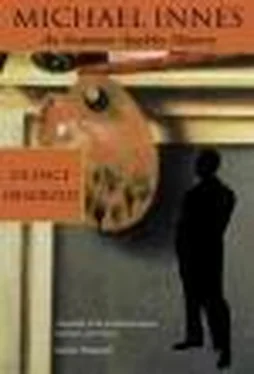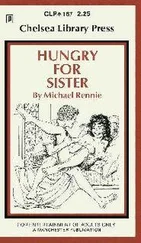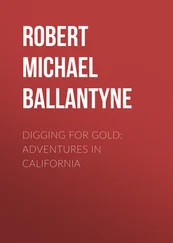Michael Innes - Lament for a Maker
Здесь есть возможность читать онлайн «Michael Innes - Lament for a Maker» весь текст электронной книги совершенно бесплатно (целиком полную версию без сокращений). В некоторых случаях можно слушать аудио, скачать через торрент в формате fb2 и присутствует краткое содержание. Жанр: Старинная литература, на английском языке. Описание произведения, (предисловие) а так же отзывы посетителей доступны на портале библиотеки ЛибКат.
- Название:Lament for a Maker
- Автор:
- Жанр:
- Год:неизвестен
- ISBN:нет данных
- Рейтинг книги:4 / 5. Голосов: 1
-
Избранное:Добавить в избранное
- Отзывы:
-
Ваша оценка:
- 80
- 1
- 2
- 3
- 4
- 5
Lament for a Maker: краткое содержание, описание и аннотация
Предлагаем к чтению аннотацию, описание, краткое содержание или предисловие (зависит от того, что написал сам автор книги «Lament for a Maker»). Если вы не нашли необходимую информацию о книге — напишите в комментариях, мы постараемся отыскать её.
Lament for a Maker — читать онлайн бесплатно полную книгу (весь текст) целиком
Ниже представлен текст книги, разбитый по страницам. Система сохранения места последней прочитанной страницы, позволяет с удобством читать онлайн бесплатно книгу «Lament for a Maker», без необходимости каждый раз заново искать на чём Вы остановились. Поставьте закладку, и сможете в любой момент перейти на страницу, на которой закончили чтение.
Интервал:
Закладка:
‘Hath a toothless mastiff bitch–’
‘Which,’ Sybil said severely.
‘I beg your pardon?’
‘Which, not bitch.’
‘We’ll look it up.’
In the circumstances, you will say, a fantastic and foolish colloquy. And at this moment, as if to mark disapproval, the light went out. The hounds, however, carried on.
Rather nicely and chastely Sybil felt for my hand. ‘Mr Gylby,’ she said – we had exchanged names – ‘I’m just a mite disheartened.’ So I gave a firm clasp – not the vulgar and suggestive thing you’d call a squeeze – and said in my brief way it was lucky the light hadn’t gone out half an hour earlier. At that it appeared again for a moment, lower down and to the left. It vanished again and reappeared yet lower to the right. Someone was coming down a winding staircase.
I took a few steps forward and flashed the torch about the building; it gave sufficient light to show we had come upon something pretty sizeable. I was cheered by that; on such a night the gentry ought to do us proud; and I lowered the torch to see if we had been stumbling through a garden or along a carriage drive. What I saw made me give a little yelp: I was standing on the edge of an abyss. ‘Moat,’ said Sybil. She put a hand on the torch and flashed it to the left. ‘Drawbridge.’ I think she was rather thrilled; it was my turn to be a mite disheartened. I knew these castles: there would be icicles depending from the noses of the trophies in the hall – just as in the one I’d escaped from that morning. ‘Will you dreadfully mind,’ I asked, ‘sleeping in the haunted room?’ To which she replied briskly: ‘I’m not psychic, Mr Gylby,’ and added: ‘Look!’
Low down and over to the right there had appeared a crack of light. Cautious exploration along the edge of the moat revealed a second bridge – non-drawable – and over this a little postern door had been opened an inhospitable inch. We crossed, our feet crunching in the snow. At our nearer approach the hounds revved up, but still no more than an inch of candlelight showed through the door. So I knocked. Whereupon a plebian voice said: ‘Is that the doctor?’
They’d got us wrong. ‘We are two people,’ I explained to the chink of candle-light, ‘that have had a motor accident.’ For it seemed fair enough to put it as strongly as that and I was all out to strike the note of pathos. But the information was not a success. The chink vanished. The door shut.
Sybil said: ‘I’ll say!’ I won’t say what I said. But as I was saying it there came a development – nothing less than a great clanking of chains. Sybil said: ‘The Ghost!’
You will agree, Diana, that the days of keeping women in happy ignorance are over. I said: ‘The dogs.’
But hard upon this agitating situation things ameliorated rapidly. A gentleman’s voice made itself heard – presumably rebuking the churlish custodian – and then the door was flung open and the same voice said: ‘Please come in.’
So in we went, each clutching a suitcase as if the place were a hotel. Our host had hold of Sybil’s in a flash and said with the sort of heavy courtesy distinguished old persons can manage: ‘Welcome to Erchany. My name is Guthrie.’
Said Sybil in her most fetching American: ‘How strange! My name is Guthrie too.’
Mr Guthrie of Erchany gave her a quick look with an eye that gleamed in the candle-light. ‘An additional occasion,’ he said, ‘for such hospitality as we can contrive. First, we must find you rooms and a fire.’
All just as it should be and hardly worth so lengthily writing home about (darling, darling Diana!). All as it should be – and strange therefore that I received the immediate impression that this Mr Guthrie is mad . I think he is mad, and what’s more I thought he was mad before I had really viewed his Mad-as-a-Hatter’s Castle.
It was something in his eye, I believe, as he first looked us over in that uncertain glimmer from his candle. Perhaps it is merely that he is a mathematician or a chess-player, for I had the oddest feeling as he looked at us that he was really plotting us on an invisible graph or giving us our places on an invisible board. Perhaps, again, I was just feeling a bit of a pawn: one does after all that snow. But whatever the cause of my first impression, the feeling has grown on me since. And the dogs were the next thing that helped.
Of course one is careful to keep one’s dogs in good condition through the winter and all that, but these dogs – the two that accompanied us in search of rooms and a fire – are starving: something quite out of the way in a country gentleman’s house. I was devoutly thankful their less domesticated companions – still giving tongue in some court nearby – hadn’t been loosed off at us as first planned. And at that I glanced round for the retainer who had so unkindly received us. For a moment the laird of Erchany seemed to be quite alone, and then I became aware of a ruffian skulking in the shadows. This proved presently to be the Hardcastle I’ve mentioned; he looked ready and willing to brain us for our small change, and he was introduced with ceremony as the laird’s factor. A factor, you know, means an agent, and his employment usually implies considerable estates. So it is odd that the laird’s factor is undoubtedly a sort of butler and odd man as well – and odd that the laird himself appears to be in the deepest poverty.
Erchany is the strangest place. A wind had been rising during our walk, a really cold night wind that added considerably to the general discomfort. But when there is one wind outside there are about twenty winds in Erchany. One was blowing straight up the long corridor we were first led down, and on the floor a worn and tattered carpet was working like a sea, flowing towards us in little billows like some surface in a dream. A crosswind was blowing snowflakes through broken panes in a long line of windows, and these were caught by some further current and quite weirdly sucked up the staircase we presently ascended. It is a beautiful staircase, stone and with a great balustrade of fretted stone that must be the work of French medieval craftsmen, on each landing rampant monsters in stone with what I take to be the Guthrie motto: Touch not the Tyger . Not, Sybil whispered, homey – but impressive in a gloomy way. And that, incidentally, might describe our host, a tall, gaunt, aloof person, with strongly marked features and heavy – haunted, I was going to write – lines round the mouth and eyes; an intimidating old man even to a back view, which was all we had at the moment as he led us down a rather windier upper corridor, the cut-throat Hardcastle padding along with the suitcases behind. We met nobody – unless a scuttling rat or two be worth mentioning – until we came to a couple of facing doors: Miss Guthrie to the right, Mr Gylby to the left. And on the threshold the laird of Erchany paused: Was I, by chance, related to Horatio Gylby? It always pleases me to acknowledge great-uncle Horatio, that eminent fin-de-siècle professor of bad living and worse verse – so I said Yes, and that I had been his favourite great-nephew. Whereupon old Mr Guthrie looked at me with a sort of absent interest, and murmured that once they had exchanged their compositions. So I suppose he is a poet. One wouldn’t think of Erchany as a canary cage, or that the local owls have anything in the way of rivals as melodists. I now conclude that when the good laird gives me that peculiar chess-player’s look he is simply searching for a rhyme for Gylby.
Sybil’s room is rather nice; it seems to stand ready as a guest-room, which is somehow unexpected. A bed as broad as a battlefield, snowy sheets – not the right association for our comfort at the moment, this – and everything tolerably shipshape, with the only broken window pane neatly patched with brown paper. But in my quarters the establishment crashes badly: flutterings in the gloom of the ceiling; scamperings in the dirt of the floor; the bed undraped but not, alas, untenanted; the Erchany winds here playing unaccountably at slow motion and eddying in a stately saraband about the room. Guthrie, it must be said, did look round a little doubtfully. ‘Hardcastle,’ he called, ‘get your wife.’
Читать дальшеИнтервал:
Закладка:
Похожие книги на «Lament for a Maker»
Представляем Вашему вниманию похожие книги на «Lament for a Maker» списком для выбора. Мы отобрали схожую по названию и смыслу литературу в надежде предоставить читателям больше вариантов отыскать новые, интересные, ещё непрочитанные произведения.
Обсуждение, отзывы о книге «Lament for a Maker» и просто собственные мнения читателей. Оставьте ваши комментарии, напишите, что Вы думаете о произведении, его смысле или главных героях. Укажите что конкретно понравилось, а что нет, и почему Вы так считаете.











